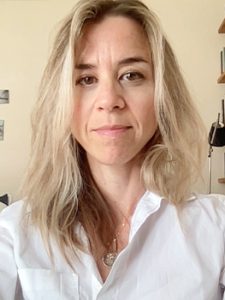
Bio
Dr Angie (Angeliki) Kehagia is a scientist, doctor, teacher and patient advocate. She graduated from Pierce in 1999 with distinction and was honoured to address her peers at Commencement. She read Experimental Psychology at Oxford as a Newman Scholar and completed her PhD in Neuroscience at Cambridge as a Gates Foundation Scholar. She later went on to complete graduate medical training at Barts and The London School of Medicine and Dentistry as a Foulkes Fellow.
Angie has held numerous academic posts including a Sir Isaac Newton fellowship at Trinity College, Cambridge, fellowships at the University of St Andrews, the University of British Columbia, Canada, and lectureships at Birkbeck and King’s College London. She is known primarily for her work on cognitive impairment and dementia in Parkinson’s disease, and also served as Medical Advisor at the Cure Parkinson’s Trust, leading on patient communication and advocacy for those living with the condition and their families.
She currently serves as Deputy Director at the King’s Technology Evaluation Centre, where she works with patients, scientists, clinicians and regulators to deliver large scale evaluations of new health technologies aimed at improving patients’ lives and helping healthcare systems to deliver these benefits at scale.
As an experienced teacher and award-winning writer, she has lectured and spoken to audiences ranging from medical students and healthcare professionals to patient groups, law faculty and disaster relief workers. She currently shares her time between London and Athens.
Q&A
Q: What are 3 enduring values Pierce has taught you?
Deal in respect.
Win gracefully.
And, as it turns out, Non ministrari sed ministrare. Little did I know that the school motto, discrete but ever present, would have such an impact. Advocacy and service are major themes in my life.
Q: Describe Pierce in three words.
Words I associate with Pierce are Ymittos and international, for obvious reasons.
Resilient, because of the school’s history that goes back to Smyrna in Asia Minor, which is coincidentally from where the Greek part of my family hails.
Q: Which is your fondest memory from your time at Pierce?
I recall having spirited debates with some wonderful (and very patient) teachers.
Q: What do you miss most from your days at Pierce?
Actually, it’s the scent of pines and the natural environment in which the school is embedded. It hadn’t really occurred to me at the time how lucky I was to spend these formative years in such close proximity to nature.
Q: If you could go back in time, is there anything that would you do differently?
Probably not. Rebelliousness and awkwardness are just part of youth.
Q: Where was your favorite spot on campus?
The whole campus is laid out so intelligently. The library was great.
Q: Who was your favorite teacher and why?
It would have to be Georgia Marketos, one of our English teachers in Lykeio, for the care and sheer verve, egalitarian spirit and authenticity she brought to class. She dealt in pure force of reasonable argument. I try to channel that energy when I teach.
Q: After graduation, have you maintained a relationship with your school and classmates?
Unfortunately, with just a few. Coming across old classmates in various walks of life is heartwarming though. There is always a sense of connection.
Q: Looking back, how did your time at Pierce help you become the person you are today?
It was at the Forensics club and with the help of generous teachers that I recall realising I could craft an argument to convince, in the classroom and at public speaking competitions. For a teenager, this was potent learning. It was truly empowering. I think it’s what gave me the gumption to apply to Oxford at 17 (much to my parents’ surprise), and what fuelled my absolute confidence in negotiating those interviews and exams at the time.
Q: What advice would you give a new Pierce student?
Join the Forensics Club! Learning how to convince your audience and debate effectively and respectfully will stand you in good stead in all aspects of life. In time you may see this as the art of influence.
Q: Where do you get your inspiration from?
The short answer is everywhere. To me, inspiration is a state of mind and an orientation to the world. It’s about becoming aware of possibility and dreaming fearlessly.
Q: What is your motto in life?
There are two that have stood the test of time and served me well in science, medicine and life more generally. They’re about authenticity and ethics.
“Live by clarity of intention” is a good practical guide. As is this quote by Linus Pauling: “Do unto others 20% better than you would expect them to do to you, to correct for subjective error”. Words to live by.
ACG Alumni: We Stay Connected!

